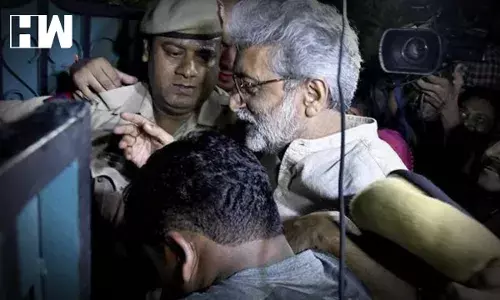Mumbai: On Tuesday, the Bombay High Court dismissed a plea made by activist Gautam Navlakha, an accused in the Elgar Parishad-Maoist link case, requesting to be placed under house arrest rather than judicial custody at Taloja jail since it lacked basic facilities.
Mr Navlakha’s plea was dismissed by a bench of Justices SB Shukre and GA Sanap, who said that if he had any grievances about the lack of medical aid and basic facilities at Taloja jail – the grounds he had cited while seeking house arrest – he should report them to the special National Investigation Agency, or NIA, court.
The high court ordered the superintendent of the Taloja prison in Navi Mumbai, where Mr Navlakha is being held as an undertrial in the case, to allow him with access to the internet.
“The present petition is dismissed. The petitioner will be at liberty to bring to the attention of the presiding officer of the special NIA court, the grievances in respect of difficulties faced by him in prison,” the bench said.
The officer is directed to ensure the grievance is redressed within parameters of the law, it said.
Mr Navlakha had petitioned the high court earlier this year, through lawyer Yug Chaudhry, to be transferred to house custody rather than judicial custody.
The activist claimed to be a senior citizen who suffered from a variety of health issues.
Mr Chaudhry had stated that the trial in the matter was unlikely to commence soon, requesting the court to impose whatever conditions it saw fit, but to allow Mr Navlakha to be moved out of Taloja jail and placed under home arrest.
The NIA had urged the high court not to grant Mr Navlakha home arrest relief, claiming that it would cause problems, including as the difficulty to prevent him from using social media while he was out of prison.
NIA counsel Additional Solicitor General Anil Singh had said that the grounds raised by Mr Chaudhry for house arrest were common grievances such as Mr Navlakha suffering from hypertension and the prison being overcrowded.
According to the investigation agency, it was common known that India was a crowded country, with Mumbai being particularly so. As a result, the overcrowding at Taloja jail was not a sufficient reason to award house arrest.
Mr Navlakha’s request was also challenged by the Maharashtra government, which notified the court that the jail officials would provide him with medical care.
As an independent media platform, we do not take advertisements from governments and corporate houses. It is you, our readers, who have supported us on our journey to do honest and unbiased journalism. Please contribute, so that we can continue to do the same in future.

